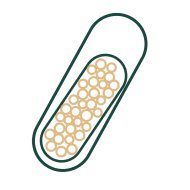
Do you have questions?
Need additional advice? No problem! Ask our team of experts. We'd love to hear from you.

Hot flashes are a common symptom that many women experience during menopause. These sudden bursts of heat, often accompanied by sweating and a flushed face, can be uncomfortable and sometimes even disruptive. But what exactly causes these hot flashes? And more importantly, what steps can you take to reduce or better manage them? In this blog, we explore the causes of hot flashes and provide practical tips to help you navigate this phase of your life with greater comfort.

Hot flashes are sudden, intense heat waves that primarily occur on the face, neck, and chest. They are often accompanied by redness, excessive sweating, and a general feeling of discomfort. These symptoms result from the dilation of blood vessels just beneath the skin, caused by a drop in estrogen levels. This drop leads to poor temperature regulation in the hypothalamus, the area of the brain responsible for controlling body temperature.
The frequency of hot flashes varies greatly among women, but they typically occur several times a day. In some cases, they can persist for years after menopause. Around 75% of women experience hot flashes during menopause, although their duration and intensity usually decrease over time. Common symptoms include extreme heat, night sweats, a racing heart, and sometimes even dizziness or feelings of anxiety. [2].
During menopause, hot flashes are primarily caused by a decrease in estrogen levels. This hormonal drop disrupts the body's thermoregulation system. Normally, the hypothalamus maintains body temperature by triggering appropriate vasomotor responses, such as dilating blood vessels to release heat. However, when estrogen levels fall, this mechanism becomes ineffective, leading to sudden hot flashes and excessive sweating [3].
In addition to hormonal changes, other factors can exacerbate these symptoms. For instance, genetic factors may influence an individual's sensitivity to hot flashes. Lifestyle factors such as smoking, alcohol consumption, caffeine, and being overweight are also associated with an increase in the frequency and intensity of hot flashes [4]. Stress and anxiety may further aggravate these symptoms by disrupting neurotransmitters that regulate body temperature. Lastly, ethnic differences have been observed, suggesting that certain populations may experience more or fewer hot flashes, although further studies are needed to confirm this [5].

Opt for clothing made from natural materials like cotton or linen, which allow your skin to breathe. Avoid synthetic fabrics that trap heat and moisture, as they can worsen the redness.
Use a fan or air conditioning to ventilate your home and lower the temperature. Sleep with light sheets and keep the window open. This will help prevent waking up at night due to hot flashes.

By keeping a diary, you can track what triggers your hot flashes. Pay attention to your food, drink, and daily activities to identify the triggers that worsen your symptoms, such as caffeine, alcohol, or spicy food.
Regular physical activity can help reduce the frequency and intensity of hot flashes. Activities like walking, swimming, or any other form of exercise, promote circulation and help maintain fluid balance.

It’s important to manage stress to minimize hot flashes. Deep breathing, meditation, or yoga can help calm the nervous system and keep your body temperature stable.
Choose a balanced diet with fruits, vegetables, lean proteins, and whole grains. This helps maintain optimal energy levels and hormonal stability, which can reduce the frequency of hot flashes.

Make sure to stay hydrated throughout the day. Water plays an essential role in regulating body temperature and preventing dehydration, which can worsen menopause symptoms.
To improve your sleep, you can place a cooling pillow under your head or use an ice pack on your neck. This can help lower your body temperature and prevent waking up at night due to hot flashes.

Healthy fats, such as those found in avocados, nuts, and olive oil, play a crucial role in maintaining hormone production and can help reduce the sensation of heat.
Hot flashes and other menopause symptoms can be worsened by smoking. By quitting smoking, you can improve your overall health and reduce the intensity of hot flashes.

Phytoestrogens, such as those found in soy, flaxseed, and sesame seeds, have the ability to partially mimic the effects of estrogen in the body and can help reduce menopausal symptoms like hot flashes.
Hot flashes can also be triggered or worsened by alcohol consumption. Reduce or eliminate alcohol to see if it helps alleviate your symptoms. Just like quitting smoking, it's a gift to your overall health.

Coffee, tea, and some soft drinks contain caffeine, which can increase the frequency of hot flashes. Make sure to limit your caffeine intake to see if it improves your symptoms.
For severe symptoms, it’s advisable to consult your doctor about hormone replacement therapy. Low-dose bioidentical hormones can be used to balance estrogen levels and reduce hot flashes.

It can be beneficial to support your body with supplements specifically designed to meet your changing hormonal needs during perimenopause. The Insentials Peri Menopause Pack consists of three supplements that work together to support hormonal balance, alleviate menopause symptoms, and promote overall health.
Thanks to the combination of these supplements, the Insentials (Peri) Menopause Pack provides comprehensive support to help you navigate this period with greater comfort.
Sources
[1] Freedman, R. R. (2002). Menopausal hot flashes: Mechanisms, endocrinology, treatment. Journal of Steroid Biochemistry and Molecular Biology, 83(1-5), 89-95. doi:10.1016/s0960-0760(02)00276-1.
[2] Thurston, R. C., et al. (2020). Hot flashes and cardiovascular disease risk: a prospective cohort study. Menopause, 27(1), 26-33. doi:10.1097/GME.0000000000001440.
[3] Freedman, R. R. (2009). Menopausal hot flashes: Mechanisms, endocrinology, treatment. PubMed, https://pubmed.ncbi.nlm.nih.gov/19903037/.
[4] Thurston, R. C., & Joffe, H. (2011). Vasomotor symptoms and menopause: Findings from the Study of Women's Health Across the Nation. PubMed, https://pubmed.ncbi.nlm.nih.gov/19903038/.
[5] Avis, N. E., Stellato, R., Crawford, S., et al. (2001). Race/ethnicity and the occurrence of menopausal symptoms. PubMed, https://pubmed.ncbi.nlm.nih.gov/11554541/.